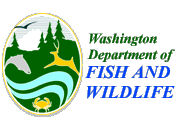WDFW Recognizes Volunteers For Fish And Wildlife Stewardship

OLYMPIA, WA –-(AmmoLand.com)- Five state residents received Volunteer of the Year awards from the Washington Department of Fish and Wildlife (WDFW) this month for their work in areas ranging from habitat restoration to animal husbandry.
WDFW also presented separate awards to landowners, educators and an eastern Washington land trust for their own contributions to fish and wildlife stewardship.
“Our department, perhaps more than any other in state government, relies heavily on volunteers for help in meeting our objectives,” said Phil Anderson, WDFW interim director. “Fortunately, we have a strong network of support, as evidenced by the people we are honoring this year.”
Recipients of the 2009 Volunteer of the Year award include:
- Jerry Ponti, who operates a veterinary clinic east of Spokane, has treated hundreds of wild animals along with pets and livestock over the past 30 years. Wildlife biologists have long relied on Ponti to care for sick and injured deer, raccoons, eagles, bobcats and other wildlife.
- Mike Braaton, of Castle Rock, who has spent hundreds of hours over the past decade planting elk forage, pulling scotch broom and conducting wildlife surveys on WDFW projects at the Mount St. Helens Wildlife Area. A professional mechanic, he has helped to keep project equipment running and has personally secured several grants for work at the wildlife area.
- Bill Butler, of Cheney, who first volunteered with WDFW in 1964 and spent more than two decades helping staff at the Spokane Hatchery spawn rainbow trout. A longtime member of the Inland Northwest Wildlife Council and the Bighorn Foundation, he also has coordinated efforts to restore upland game habitat and promote outdoor education.
- Robert Heirman, of Snohomish, who has volunteered his time, money and expertise to projects benefitting fish and wildlife recreation for more than 50 years. His contributions include planting fish in lakes and streams, building fishing docks, conducting salmon derbies and preserving what are now the Bob Heirman Wildlife Park and Lord’s Hill Park in Snohomish County for outdoor recreation.
- Charles (“Stan”) Staniforth, of Bellevue, who has tallied thousands of hours leading tours and teaching schoolchildren about salmon at the Issaquah Salmon Hatchery. He also helps hatchery staff clean incubation trays, tally fish and maintain the facility.
- Interim WDFW Director Anderson presented those awards during individual ceremonies conducted in July at regional offices throughout the state. In addition, Anderson presented awards in three other categories.
Organization of the Year
The Okanogan Valley Land Council (OVLC) received this year’s Organization of the Year award during a July 22 ceremony in Ephrata. Since the OVLC was established in 2002, it has worked with six landowners to protect nearly 2,000 acres of native shrub-steppe and riparian habitat from development by securing easements on the properties. Using agricultural easements, the land trust also provided similar protection for a 1,025-acre cattle ranch and 600 acres in the Okanogan Highlands.
Educator of the Year
This year’s Educator of the Year Award was presented to Scott Olson, a principal and instructor at the Tonasket Alternative School, and George Thornton, a teacher with the Oroville School District. Working together, the two educators engaged their students in a photo-monitoring project, designed to assess environmental changes in the Sinlahekin Wildlife Area. Students developed an understanding of local history, area botany, photography, global positioning system (GPS) skills and other disciplines.
Landowner of the Year
This year’s recipients of the Landowner of the Year award were:
- Jack Burkhalter, a lifelong resident of Pacific County, who has worked with state fishery managers for 30 years to establish and maintain viable populations of salmon in the various streams flowing through his property.
- Richard and Kathy Rice and family, who own a 10,000 acre farm in Douglas County. The Rice family has worked for the past decade to preserve and improve hundreds of acres of habitat for wildlife, notably Columbian sharp-tailed grouse.
- Karen and Tony Spane, who own a 300-acre dairy farm in the Marshland Diking District near Everett. The Spanes were early supporters of a proposal by the City of Everett to restore a portion of the diking district as chinook salmon habitat, helping others to see the benefits of the project for both salmon and outdoor recreation.
